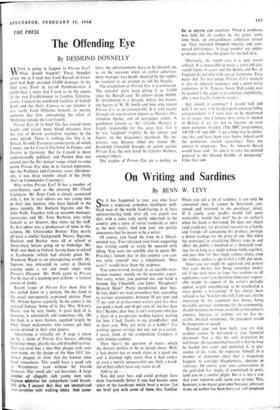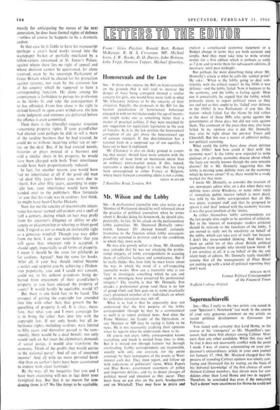On Writing and Sardines
By BENN W. LEVY
SO it has happened to you; you who have been a respected, orthodox, intelligent, well- liked man of the world, God-fearing or at least opinion-fearing (and, after all, vox populi vox der), with a stake (only partly inherited) in the country and a sense of social standards as alert as the next man's. And now your son quietly announces that he means to be a writer.
Of course, you faced the issue in a liberal- minded way. You refrained even from suggesting that writing could so easily be equated with idling. You were too sensible also to quote Mr. Priestley's lament that in this country you can- not write yourself into a knighthood. 'Who cares?' would have been the response.
You concentrated instead, in an equable man- to-man manner, mainly on the economic aspect. Not every writer, you pointed out, can hook a fortune like Churchill, you know. Maugham? Bernard Shaw? Pretty exceptional, dear boy. In fact, didn't we read somewhere that, according to various assessments, between 58 per cent and 77 per cent of professional writers earn less than ten quid a week and 40 per cent of 'em less than five? Besides, dear boy, it isn't everyone who has a share in a prosperous sardine factory waiting for him. I had, thanks to my grandfather; and so have you. Why not write as a bobby? I've nothing against writing; but not, not as a career. I mean, think of the competition. Compare it with tinning sardines.
Then there's the question of status—which the doctors profess to be so fussed about. Well, a bad doctor has as much status as a good one and a damned sight more than a bad author or even a'merely unsuccessful one. Only a hand- ful of best-sellers have any status at all And so on . . .
You did your best and could perhaps have done fractionally better if you had 'known some = other of the handicaps which beset a writer. Let me brief you with some of them, less familiar. When you sell a tin of sardines, it can only be consumed once. It cannot be borrowed, con- sumed and returned to the purchaser intact. If it could, your profits would fall quite noticeably, would they not? So do an author's when his book is borrowed. He does not object (and could not, for practical reasons) to a family and friends all consuming his product, perhaps a dozen readings for the price of one. But when the municipal or circulating library steps in and offers the public a hundred or a thousand read- ings for as long as a single volume holds together, and pays him for that single volume alone, even the mildest author is apt to feel a trifle put upon.
Since you too might be aggrieved and protest that your market was being somewhat under- cut if the state were to issue free sardines to all applicants, won't you therefore lend your respect- _ able weight in support of the writer's periodic appeal, largely unpublicised, to be vouchsafed a mere penny a borrowing? It has always been refused so far. You for one will. I am sure, not be impressed by the argument that books, being desirable spiritual sustenance for the community, should therefore be freely available at the author's expense; because, as sardines are no less de- sirable physical sustenance, the precedent would be dangerous to accept.
Remind your son how lucky you are that sardines cannot be borrowed to your financial detriment. Nor is this the only protection he will forgo. An occupational hazard is that he may be hauled into court and punished if, in pur- suance of his trade, he expresses himself in a manner or expounds ideas that a magistrate happens to consider blasphemous, obscene or seditious. Of course your own conversation at the golf-club bar might, if committed to print, land you in a similar plight. But it is not a risk that your vocation calls upon you to take. This, however, is no major grievance because, although many an author has been harassed and penalised
merely for anticipating the mores of the next generation, he does have formal rights of defence —unless of course he happens to be a dramatic author.
In that case he is liable to have his manuscript (perhaps a year's hard work) tossed into the wastepaper basket or partially mutilated by a fellow-citizen ensconced at St. James's Palace, against whom there lies no right of appeal and whose decision cannot be questioned, let alone reversed, even by the sovereign Parliament of Great Britain which he elected for his protection against tyranny, nor even by the common law of his country which he supposed to have a corresponding function. He alone among his countrymen is forbidden to pursue his profession as he thinks fit and take the consequences if he has offended. From him alone is the right to defend himself in open court withdrawn. On him alone judgment and sentence are delivered before the offence is even committed.
Then there is the (literally) singular situation concerning property rights. If your grandfather had elected (and perhaps he did) to sell a share of the sardine business that he had created, he could do so without incurring either tax or sur- tax on the deal. But, if he had created novels, histories or plays instead of a business and sold a similar share in his property, he would :lave been charged with both. Your inheritance would have been proportionately reduced.
In fact, for another reason, you would have had no inheritance at all if the good old man -ad died fifty years before you were due to nherit. For after fifty years, according to copy- ight law, your inheritance would have been handed over to the publishers. How fortunate `or you that his trade was in sardines. Just think, he might have been Charles Dickens.
Now for me the sanctity of interminable inheri- tance has never seemed self-evident and a spell of half a century, during which an heir may profit from his ancestor's diligence or ability or chi- canery or placemanship or whoring or blunt good luck, I regard as not so much an inalienable right as a generous windfall. Though you may differ from me here, I am sure nevertheless that you will agree that, whatever rule is accepted, it should apply impartially to all forms of property. I mean it should be the same for pilchards as for sardines. Agreed? And the same for books. After all, if your boy should indeed become a writer and surprise you by achieving a Dicken- sian popularity, you and I could not consent, could we, to his unborn grandsons being de- barred from enjoyment of their grandfather's property as you have enjoyed the property of yours? It would hardly be equitable. would it?
But there is one hard fact to be faced. The prospect of getting the copyright law amended into line with other Acts that govern the be- queathing of property is nil. It is clear, there- fore, that what you and I must campaign for is to bring the other Acts into line with the copyright law. If not only books but all in- heritance rights, including sardines, were limited to fifty years and thereafter passed to the com- munity, there would be a dual benefit: not only would such an Act meet the elementary demands of social justice, it would also transform the economy. Think of the profits that would accrue to the national purse! And all out of unearned income! And all with no more personal hard- ship than an author's heirs have been accustomed to endure with silent fortitude!
By the way, all the inequities that you and I have been examining will not in fact deter your benighted boy. But that is no reason for con- doning them, is it? We like things to be equitable.



































 Previous page
Previous page